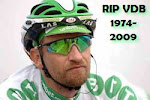Former Italian cyclist Franco Ballerini was tragically killed on Sunday after a competitive accident while contesting the 1st Rally Ronde as a co-driver for experienced pilot Alessandro Ciardi. Ballerini suffered serious injuries in the accident before passing away at the Hospital of Pistoia, while no report on Ciardi’s condition has been made available.
A rallying enthusiast, Ballerini had been invited to call pace notes for Ciardi in the Larciano event near Florence. While he was passionate about motorsport, Ballerini’s professional success surrounded the sport of cycling where he was accomplished both on and off the bicycle.
Ballerini turned professional with Magniflex in 1986, the first year in a career that spanned 15 seasons. He spent the entire duration of his career with Italian squads.
Born in Florence, Ballerini’s first professional cycling victory came on home soil at the Tre Valli Varesine in 1987. Wins continued to follow on home soil over coming years, with victories at GP Sanson and GP Città di Camaiore, but it was Ballerini’s third place at Gent-Wevelgem in Belgium in 1990 that signalled things to come from the rider.
After winning Paris-Brussel in later 1990 and finishing third at Giro di Lombardia a year later, Ballerini’s focus moved more towards stage racing. He contested the Tour de France in 1992 and was a member of the GB-MG Maglificio squad that won the team time trial stage four at the following edition.
Three years after his Gent-Wevelgem podium in 1993 Ballerini again showed his potential in the Spring Classics. He fought a close battle in the 267.5 kilometre Paris-Roubaix, finishing second to Frenchman Gilbert Duclos-Lassalle.
Signalling that a breakthrough was near Ballerini was again on the podium at Gent-Wevelgem in 1994, then third at Paris-Roubaix and second at Paris-Brussel. After nipping at the heels of Spring Classic success, 1995 was Ballerini’s year, with the Italian winning Omloop Het Volk then Paris-Roubaix, with Andrei Tchmil finishing behind him on the podium at both races and Johan Museeuw taking third in Roubaix.
He won GP de Wallonie in 1996 and was third at Ronde Van Vlaanderen in 1997. When Ballerini started 1998 with second overall at Tirreno-Adriatico, pundits were expecting big things from him that spring and Ballerini delivered with another Paris-Roubaix title.
After a successful block with Mapei-GB from 1994 to 1998, Ballerini moved to Lampre-Daikin for two years where he scored little in the way of results. Ballerini returned to Mapei-Quickstep in 2001 for one final time, where he rode just four months of the season to symbolically finish his career in Roubaix’s velodrome – the scene of his two greatest successes.
Ballerini’s contribution to Italian cycling throughout his career certainly wasn’t limited to his exploits on the bike. Since retiring from professional cycling in 2001, Ballerini managed Italy’s squadra azzurra (national team) to much success on the international stage.
A year after his retirement from competition, Ballerini oversaw the national squad as Mario Cipollini claimed the International Cycling Union (UCI) World Road Championship race in Zolder, Belgium. Ballerini formed a successful union with Paolo Bettini at the Athens Olympic Games in Greece two years later where he won gold in the men’s road race.
That union with Bettini would continue over the ensuing years, with the Italian cyclist winning the UCI World Road Championship in Sulzburg, Austria in 2006 and again the following year in Stuttgart, Germany. The worlds headed to Varese, Italy the following year where Ballerini led the team to a brilliant one-two, with Alessandro Ballan winning the title from compatriot Damiano Cunego.
Sunday, February 07, 2010
Subscribe to:
Post Comments (Atom)







Damn shame. Why do all the interesting characters end-up getting themselves killed, leaving widows and kids who'll grow-up with inadequate moms?
ReplyDeleteSo you're saying Ballerini was a fucking idiot for getting himself killed when he had a wife and children to look after?
ReplyDelete